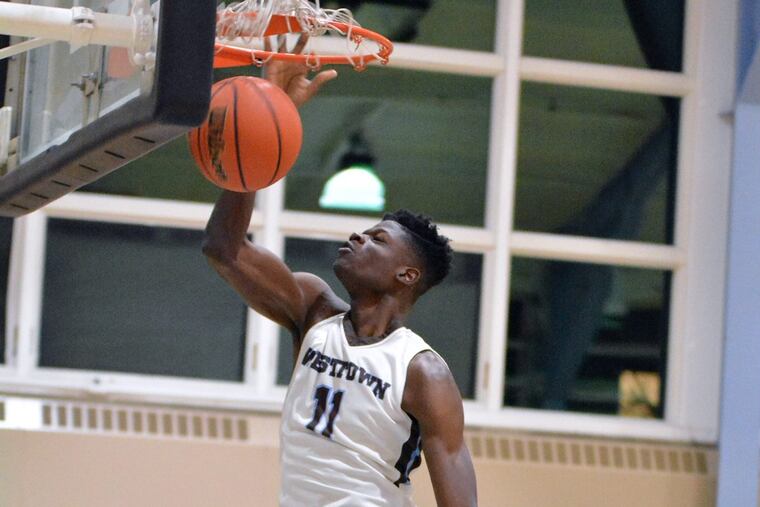Welcome to the big-time, Mo Bamba | Mike Jensen
It isn't just his brother looking to profit from Bamba's skills.

Mo Bamba is an extraordinarily gifted teenager, and those attributes apparently extend well beyond the boundaries of a basketball court. His reputation is big-time, on and off the court. There are some things, however, that are out of the control of an impressive 7-footer headed for the University of Texas from the Westtown School.
Bamba can't choose his family, and if you're 7 feet tall, you don't even really choose your sport. You sure don't get to pick the structure of your sport, the part that tells you when you're allowed to get paid in accordance with your skills.
Buckets of waters already have been thrown on the incendiary story put out this week by Bamba's brother, Ibrahim Johnson, during a poolside Facebook video rant, claiming that Bamba was breaking NCAA rules by taking gifts from Greer Love, the vice president of a financial group.
I asked Westtown coach Seth Berger if he'd talk, and he had the school send me this statement, from Michele Bedesem Linder, co-director of athletics at the Chester County school: "We fully support the upstanding student-athlete and community member we have known Mohamed Bamba to be. During his time at Westtown, Mo's family approved Greer Love as a family point-of-contact to help manage and mentor him throughout the college recruitment process."
Love had met Bamba nine years ago, and according to a story on Horns247Sports, which covers University of Texas athletics extensively, Love started an after-school program at Bamba's elementary school in Harlem and has supplied support, including financial, to multiple students from the school, the others not headed for college on hoops scholarships.
"Mo's got way too much to lose to take any chances on anything even remotely impressible,'' Love told Horns 247. "With my nine-year, pre-existing relationship on the line with Mo personally, let alone his college eligibility, I took several additional steps to ensure that Mo was fully compliant every step of the way."
Further, the Horns247Sports story reported a number of recent arrests in Florida and Ohio by Johnson, three in March for hit-and-run, forgery, petty theft and possession of drugs. The story said the family had worked to keep him out of Bamba's recruiting.
That's a lot of water thrown on the story. One bottom line: Love isn't some runner sent in by a financial firm looking to represent Bamba. (Not that that ever happens.)
Another bottom line: If Bamba were, say, a soccer player, he'd already be a millionaire. His value says maybe multi-millionaire.
How so? Look at soccer, where the free market practically has made college soccer obsolete for top American prospects.
The obvious example close to home is Christian Pulisic, from Hershey, now starring for the U.S. national team as an 18-year-old. Pulisic didn't bother with NCAA soccer. He was signed by Borussia Dortmund, the second-largest professional club in Germany, in February 2015. By last season, Pulisic was playing in front of 80,000 people. He's reportedly making more than a million dollars a year, and that figure is due to skyrocket.
It isn't just the No. 1 star getting paid. The vast majority of Americans on the U-20 national team already are professionals, either in Major League Soccer or abroad. That's the system, just as tennis and other sports encourage early professionalism.
Other than football, which has legitimate safety reasons to keep players from going pro too early, the NBA is a rarity in sports these days, not allowing players to enter their league until a year after their class finishes high school. They're looking at changing this rule, but the future remains murky. Letting players learn their trade in college, and actually go to college, obviously isn't a bad thing. But is it fair? There was a period when players went to the NBA straight out of high school. It didn't hurt Kobe Bryant or LeBron James or Kevin Garnett; just made them more money. Others weren't ready and soon proved it.
Bamba would have been a high lottery choice in this year's draft if he had been eligible for it. He's a big man with a bigger arm span and an ability to get from here to there in a heartbeat. He remains a work in progress at the offensive end but has all sorts of skills that fit the modern NBA game.
The system says he has to go to college for a year, and he chose Texas, which hopes to gain from this decision beyond the massive revenues the school already takes in. (When you have to figure out how to spend more than $180 million in revenue, you're big-time.)
This isn't to suggest that scholarships aren't worth much. They are worth a ton. It's just that the value of a player such as Mo Bamba exceeds that value by most any metric.
Yes, he could have gone to Europe and played against even tougher hoops competition, but that isn't the American way, not yet anyway. (And he'll gain from increased marketing if he can lead the Longhorns deep into March Madness.)
The American way is to be part of a system that is hypocritical at best, even if a Facebook rant by a brother looking to get his turns out to be just that.